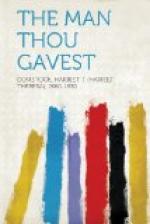With distance and reassurance on her side, Nella-Rose paused to take breath. She had been thoroughly frightened. Her beautiful plans, unsuspected by all the world, had been threatened by an unlooked-for danger. She had never contemplated Burke Lawson as a complication. She was living day by day, hour by hour. Jim White she had accepted as a menace—but Burke never! She was no longer the girl Lawson had known, but how could she hope to make him understand that? Her tender, love-seeking nature had, in the past, accepted the best the mountains offered—and Burke had been the best. She had played with him—teased Marg with him—revelled in the excitement, but now? Well, the blindness had been torn from her eyes—the shackles from her feet. No one, nothing, could hold her from her own! She must not be defrauded and imprisoned again!
Yes, that was it—imprisoned just when she had learned to use her wings!
Standing in the tangle of undergrowth, Nella-Rose clenched her small hands and raised wide eyes to the skies.
“I seem,” she panted—and at that moment all her untamed mysticism swayed her—“like I was going along the tracks in the dark and something is coming—something like that train long ago!”
Then she closed her eyes and her uplifted face softened and quivered. Behind the drooping lids she saw—Truedale! Quite vividly he materialized to her excited fancy. It was the first time she had ever been able to command him in this fashion.
“I’m going to him!” The words were like a passionate prayer rather than an affirmation. “I’m going to follow like I followed long ago!” She clutched the basket and fled along.
And while this was happening, Truedale, in his cabin, was working as he had not worked in years. He had burned all his bridges and outlying outposts; he was waiting for White, and his plans were completed. He meant to confide everything to his only friend—for such Jim seemed in the hazy and desolated present—then he would marry Nella-Rose off-hand; there must be a minister somewhere! After that? Well, after that Truedale grasped his manuscript and fell to work like one inspired.
Lynda Kendall would never have known the play in its present form. Truedale’s ideal had always been to portray a free woman—a super-woman; one who had evolved into the freedom from shattered chains. He now had a heroine free, in that she had never been enslaved. If one greater than he had put a soul in a statue, Truedale believed that he could awaken a child of nature and show her her own beautiful soul. He had outlined, a time back, a sylvan Galatea; and now, as he sat in the still room, the framework assumed form and substance; it breathed and moved him divinely. It and he were alone in the universe; they were to begin the world—he and—
Just then the advance messenger of the coming change of weather entered by way of a lowered window. It was a smart little breeze and it flippantly sent the ashes flying on the hearth and several sheets of paper broadcast in the room. Truedale sprang to recover his treasures; he caught four or five, but one escaped his notice and floated toward the door, which was ajar.




